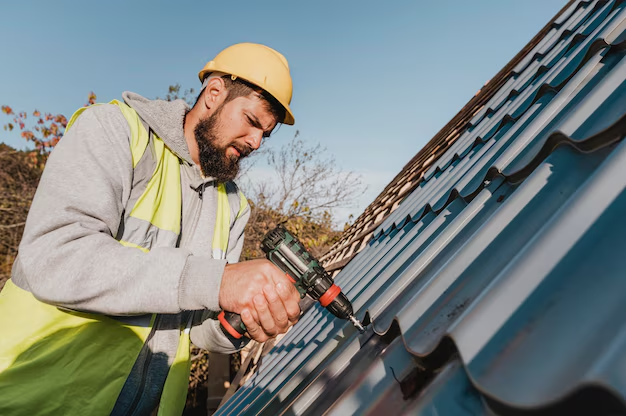Let’s talk about something that doesn’t get enough attention in most homes—the foundation. We usually think about kitchens, bathrooms, and the living room, but the foundation is the most important. If your foundation is in trouble, so is your home. And trust me, foundation repairs can be crazy expensive. But the good news is, you can prevent most of it. How? By making sure your drainage system is working right. Yep, you read that correctly—proper drainage is key to keeping your foundation safe.
So, What’s Proper Drainage Anyway?
To put it simply, proper drainage means water needs to flow away from your house. If water collects near your foundation, you’ve got a problem. Over time, that water can create cracks and cause your foundation to shift. And if that happens? Big repair bills. The most important part of keeping water away from your foundation? Gutters. Yup, gutters do a lot more than you think. They catch rainwater from the roof and send it down the downspouts. But if your gutters are clogged or not installed correctly, water will spill over and flood around the house. That’s when things get bad. That’s why the gutter installation is super important. It helps keep water away from the base of your home.
Why is Proper Drainage So Critical?
Think of your foundation as the backbone of your home. Without it, your whole house is in trouble. If the foundation is damaged, everything else can fall apart. Water is the biggest culprit here. If water builds up around your foundation, it can seriously damage it. That’s why you need to understand why drainage matters. Let’s break it down.
Water Damage
Water loves to find cracks. If your foundation has even the tiniest crack, water will slip in. And guess what? Those cracks will get bigger over time. The more water that gets in, the worse it gets. That leads to serious structural issues. Not fun, right?
Soil Erosion
Water can also mess with the ground around your foundation. When it collects, it starts to erode the soil. This makes the ground around your foundation unstable. As the ground shifts, your foundation may start to sink. And we’re talking about problems like uneven floors or walls. Not something you want to deal with.
Basement Flooding

Think your basement is safe? Think again. If water isn’t flowing away from your house, it can sneak into the basement. And that’s a real nightmare. Water damage can ruin furniture, electronics, and more. Plus, standing water is the perfect place for mold to grow. Before you know it, you’re dealing with a flood AND a mold issue. That’s one mess you don’t want.
How Can You Protect Your Foundation?
Now that we know what can go wrong, let’s figure out how to keep it from happening. The good news is, that protecting your foundation isn’t that hard. It just takes a few simple steps.
- Install Gutters and Downspouts
Gutters and downspouts are your first defense. They help guide rainwater away from your home. If your gutters are clogged or missing, water will spill over and pool around your foundation. And that’s when things start going downhill. Make sure you have proper gutter installation and that your gutters are cleaned regularly. It makes all the difference.
- Ensure Proper Slope Around Your Home
The ground around your home should slope away from the foundation. If it’s flat or slopes toward the house, water will collect there. You don’t want that. So, check the slope. If you need to, regrade the soil to make sure water flows away from the house.
- Use Downspout Extensions
Sometimes, your gutters and downspouts need a little extra help. That’s where downspout extensions come in. These extensions guide water even farther away from your house. It’s a simple fix that can keep water from pooling too close to your foundation.
- Consider a French Drain
If you’ve got a lot of water problems, a French drain might be the way to go. It’s a trench filled with gravel and a pipe that collects water and redirects it. It’s a solid solution if you live in a rainy area or have a lot of water pooling near your foundation.
- Seal Cracks in Your Foundation
Cracks in your foundation are normal. Over time, they happen. But you can prevent water from getting in by sealing them up. Even small cracks can let water in, so it’s better to fix them right away. You can seal cracks yourself, or hire a pro to do it for you. Either way, sealing cracks can save you from bigger problems down the road.
Keep Up with Regular Maintenance
Proper drainage is not a one-time fix. It’s something you need to stay on top of. Regular maintenance can save you a lot of money and hassle later on.
Clean Your Gutters
You might hate cleaning gutters, but it’s something that must be done. If your gutters get clogged, water will spill over and sit around your foundation. Make it a habit to clean them at least twice a year. If you live in a place with lots of trees, clean them more often. Trust me, it’s worth it.
Watch for Standing Water
After it rains, check around your home for standing water. If you see any near your foundation, you’ve got a problem. It means water isn’t flowing away like it should. You might need to adjust the slope of your yard or add more downspout extensions. Either way, make sure water isn’t lingering near your foundation.
Inspect Your Foundation
Take a look at your foundation every few months. If you notice any cracks, no matter how small, get them checked out. Fixing cracks early is way cheaper than dealing with major foundation issues later.

